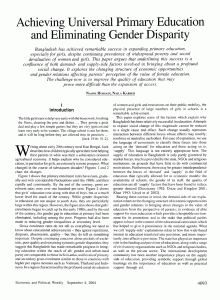‘Achieving universal education and eliminating gender disparity in Bangladesh’ Economic and Political Weekly, Vol. XXXIX No. 36 , September 4-10
 Bangladesh has achieved remarkable success in expanding primary education, especially for girls, despite continuing prevalence of widespread poverty and social devaluation of women and girls. This paper argues that underlining this success is a confluence of both demand- and supply-side factors involved in bringing about a profound social change. It explores the changing structure of economic opportunities and gender relations affecting parents’ perception of the value of female education. The challenge now is to improve the quality of education that may prove more difficult than the expansion of access.
Bangladesh has achieved remarkable success in expanding primary education, especially for girls, despite continuing prevalence of widespread poverty and social devaluation of women and girls. This paper argues that underlining this success is a confluence of both demand- and supply-side factors involved in bringing about a profound social change. It explores the changing structure of economic opportunities and gender relations affecting parents’ perception of the value of female education. The challenge now is to improve the quality of education that may prove more difficult than the expansion of access.



